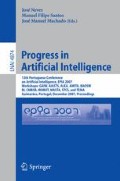Abstract
Multi-agent systems can be used in social simulation to get a deeper understanding of complex phenomena, in such a way that predictions can be provided and tested, and policies can be designed in a solid individually grounded manner. Our aim is explore this link between micro-level motivations leading to and being influenced by macro-level outcomes in an economic setting where to study the complex issue of tax evasion. While it is obvious why there is a benefit for people who evade taxes, it is less obvious why people would pay any taxes at all, given the small probability of being caught, and the small penalties involved. Our research program uses exploratory simulation and progressively deepening models of agents and of simulations to study the reasons behind tax evasion. We have unveiled some relatively simple social mechanisms that can explain the compliance numbers observed in real economies. We claim that simulation with multiple agents provides a strong methodological tool with which to support the design of public policies.
Access this chapter
Tax calculation will be finalised at checkout
Purchases are for personal use only
Preview
Unable to display preview. Download preview PDF.
References
Allingham, M.G., Sandmo, A.: Income tax evasion: A theoretical analysis. Journal of Public Economics 1(3/4), 323–338 (1972)
Andreoni, J., Erard, B., Feinstein, J.: Tax compliance. Journal of Economic Literature 36(2) (June 1998)
Antunes, L., Balsa, J., Coelho, H.: e*plore-ing the simulation design space. In: Proc. IV European Workshop on Multi-Agent Systems (2006)
Antunes, L., Balsa, J., Moniz, L., Urbano, P., Palma, C.R.: Tax compliance in a simulated heterogeneous multi-agent society. In: Sichman, J.S., Antunes, L. (eds.) MABS 2005. LNCS (LNAI), vol. 3891, Springer, Heidelberg (2006)
Antunes, L., Balsa, J., Respício, A., Coelho, H.: Tactical exploration of tax compliance decisions in multi-agent based simulation. In: Antunes, L., Takadama, K. (eds.) Proc. MABS 2006 (2006)
Antunes, L., Coelho, H., Balsa, J., Respício, A.: e*plore v.0: Principia for strategic exploration of social simulation experiments design space. In: Takahashi, S., Sallach, D., Rouchier, J. (eds.) Advancing Social Simulation: The First World Congress, Springer, Japan (2007)
Axelrod, R.: The Evolution of Cooperation. Basic Books, New York (1984)
Axelrod, R.: A model of the emergence of new political actors. In: Artificial societies: the computer simulation of social life, UCL Press, London (1995)
Axelrod, R.: Advancing the art of simulation in the social sciences. In: Conte, R., Hegselmann, R., Terna, P. (eds.) Simulating Social Phenomena. LNEMS, vol. 456, Springer, Heidelberg (1997)
Balsa, J., Antunes, L., Respício, A., Coelho, H.: Autonomous inspectors in tax compliance simulation. In: Proc. 18th European Meeting on Cybernetics and Systems Research (2006)
Decoster, A.: A microsimulation model for Belgian indirect taxes with a carbon/energy tax illustration for Belgium. Tijdschrift voor Economie en Management 40(2) (1995)
Gilbert, N.: Models, processes and algorithms: Towards a simulation toolkit. In: Suleiman, R., Troitzsch, K.G., Gilbert, N. (eds.) Tools and Techniques for Social Science Simulation, Physica-Verlag, Heidelberg (2000)
Gilbert, N.: Varieties of emergence. In: Proc. Agent 2002: Social agents: ecology, exchange, and evolution, Chicago (2002)
Jenkins, G.P., Kuo, C.-Y.: A VAT revenue simulation model for tax reform in developing countries. World Development 28(2), 763–774 (2000)
Kahan, D.M.: The logic of reciprocity: Trust, collective action and law. In: Gintis, H., Bowles, S., Boyd, R., Fehr, E. (eds.) Moral Sentiments and Material Interests – The Foundations of Cooperation in Economic Life, MIT Press, Cambridge (2005)
Kahneman, D., Tversky, A.: Prospect theory: An analysis of decision under risk. Econometrica 47(2), 263–291 (1979)
Kaplan, F.: The emergence of a lexicon in a population of autonomous agents (in French). PhD thesis, Université de Paris 6 (2000)
Kirchler, E., Hoelzl, E.: Modelling taxpayers behaviour as a function of interaction between tax authorities and taxpayers. In: Managing and Maitaining Compliance, Boom Legal Publishers (in press, 2006)
Montier, J.: Behavioural Finance: Insights into Irrational Minds and Markets. John Wiley and Sons, Chichester (2002)
Sloman, A.: Prospects for AI as the general science of intelligence. In: Prospects for Artificial Intelligence - Proceedings of AISB 1993, IOS Press, Amsterdam (1993)
Sloman, A.: Explorations in design space. In: Proc. of the 11th European Conference on Artificial Intelligence (1994)
von Neumann, J., Morgenstern, O.: Theory of Games and Economic Behavior. Princeton University Press, Princeton (1944)
Yizthaki, S.: A note on income tax evasion: A theoretical analysis. Journal of Public Economics 3(2), 201–202 (1974)
Author information
Authors and Affiliations
Editor information
Rights and permissions
Copyright information
© 2007 Springer-Verlag Berlin Heidelberg
About this paper
Cite this paper
Antunes, L., Balsa, J., Coelho, H. (2007). Tax Compliance Through MABS: The Case of Indirect Taxes. In: Neves, J., Santos, M.F., Machado, J.M. (eds) Progress in Artificial Intelligence. EPIA 2007. Lecture Notes in Computer Science(), vol 4874. Springer, Berlin, Heidelberg. https://doi.org/10.1007/978-3-540-77002-2_51
Download citation
DOI: https://doi.org/10.1007/978-3-540-77002-2_51
Publisher Name: Springer, Berlin, Heidelberg
Print ISBN: 978-3-540-77000-8
Online ISBN: 978-3-540-77002-2
eBook Packages: Computer ScienceComputer Science (R0)

